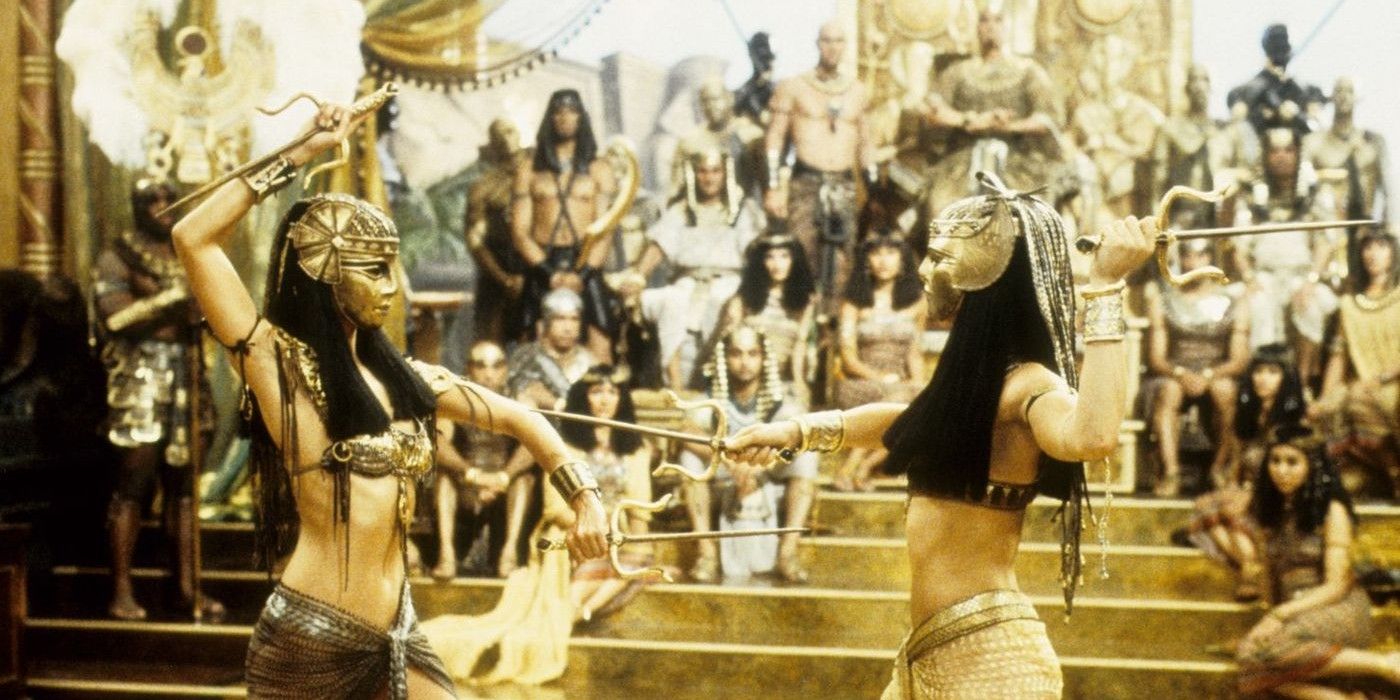Action blockbusters are finally allowing female characters to take center stage, but The Mummy franchise already tackled this trend 20 years ago. Marvel is only now emphasizing its female superheroes, such as with the long-delayed Black Widow. Meanwhile, Jungle Cruise stars Emily Blunt as a WWI-era action hero who can throw a punch as good as the Rock, but 1999’s The Mummy and its 2001 sequel, The Mummy Returns, paved the way for female-driven stories before everyone else.
Writer/director Stephen Sommers’ first Mummy adventure introduces Evelyn Carnahan (Rachel Weisz) as a clumsy but incredibly endearing librarian. She’s also a budding archaeologist, and it’s through her own determination and superior intellect that she initially awakens the cursed Imhotep (Arnold Vosloo) and then plays an integral part in killing him. Meanwhile, Anck-Su-Namun (Patricia Velásquez) is given a major role in the sequel, promoted from semi-tragic love of Imhotep to a manipulative villain in her own right.
Hollywood is now trying to make female-centric storytelling the driving force behind tentpole movies, shifting focus onto women who have their own well-defined identity separate from their relationship with the male leads. The Mummy films beat recent franchises to this feat, with Evie and Anck-Su-Namun commanding their own personal journeys, in which their love interests find themselves embroiled. Ultimately, the male hero and villain are hugely reliant on their respective partners for survival.

One major misstep of recent blockbusters is making the female hero too perfect to be relatable. Jungle Cruise’s Lily Houghton (Blunt) rarely shows vulnerability and only has one flaw, her inability to swim, which is quickly overcome. In contrast, The Mummy franchise allows Evie to make mistakes and accept help without sacrificing the character’s skills. In The Mummy Returns, she is an experienced explorer and adept fighter, thanks to training from husband Rick O’Connell (Brendan Fraser) and memories of a past life in Ancient Egypt. It’s these visions that set the film’s plot in motion, both for Evie and Anck-Su-Namun, who switches roles with Imhotep in the first film. She orchestrates his resurrection, instructing a cult to do her bidding. As her 1930s reincarnated persona, Anck-Su-Namun actively wants her memories restored and effectively uses Imhotep to achieve this goal. She encourages him to challenge the Scorpion King (Dwayne Johnson) and commandeer his immortal army to ultimately attain power herself.
Therefore, The Mummy Returns’ women lead the heroes and villains, while also sharing their own subplot based on their past identities. Their ancient rivalry isn’t concerned with the men in their lives, but about proving their own self-worth. Evie continually grows in confidence throughout the film, while Anck-Su-Namun, previously a Pharoah’s frustrated mistress, now seeks world domination. Imhotep is essentially her bodyguard, lacking his own clear motivation once reunited with his love. Evie and Anck-Su-Namun can also hold their own in a fight, their superior combat sequences far more intricately choreographed than Rick and Imhotep’s chaotic brawl. Although one fight scene involves sparse clothing, the direction is never lustful, instead emphasizing their different fighting techniques. Plus, Evie mostly wears trousers, eschewing typical 1930s clothing, and it’s never questioned, unlike Jungle Cruise’s frequent jokes nicknaming Lily “Pants”. Rick respects Evie, and they are a team – a life or death issue at the film’s climax; the women must seemingly choose whether to save their partners or themselves.
Obviously, Evie rescues Rick, but Imhotep is utterly heartbroken when Anck-Su-Namun abandons him, suggesting she was merely using his blind devotion for her own selfish ends. The Mummy movies are unapologetically romantic, yet this enriches the female characters instead of denying them agency. The franchise didn’t need to broadcast its progressive approach; this was quietly demonstrated in Rick and Imhotep’s admiration for women who could take care of themselves.




